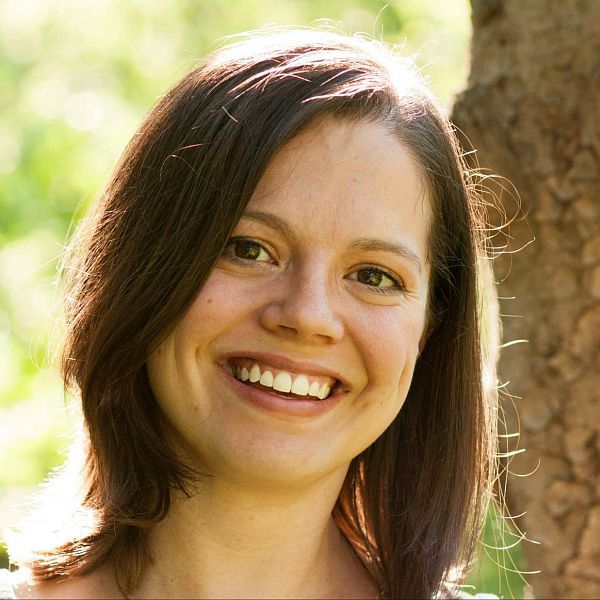Poem of the Week | July 16, 2018

Traci Brimhall: “Vive, Vive”
This week, we are excited to present a new poem by Traci Brimhall. Brimhall is the author of Saudade (Copper Canyon, 2017), Our Lady of the Ruins (W.W. Norton, 2012), and Rookery (Southern Illinois University Press, 2010). Her poems have appeared in The New Yorker, Slate, Poetry, The Believer, The New Republic, and Best American Poetry. She’s received fellowships from the Wisconsin Institute for Creative Writing and the National Endowment for the Arts. She’s an Assistant Professor of Creative Writing at Kansas State University.
Vive, Vive
Last night, I slipped my finger in the milkweed,
my hand doing the wind’s work. It was so soft,
that crooked slit aching open but not far enough
for those white tufts to float away. I couldn’t help
myself. And I didn’t want to. I wanted to tease out
those stubborn seeds and make them leave like
they’re meant to. Stupid little futures hiding from flight.
A friend tells me she had a dream about me holding
an armful of apples in a treeless field. Write a poem
about it, she says. Call it “Come What May.” I want
to call it “My Joys Are Selfish Whores” and suck
the worm from a Red Delicious. But wasn’t I good once?
Didn’t I play penitent with a floral sheet bobby pinned
to my girlish curls as I rocked the doll’s plastic lips
to my flat chest and called it the Lord’s? What now?
Lowly animal, I’ve pitied myself like any mammal
that hurts. I’ve described the papillae on a cat’s tongue
to my son, how that wet sandpaper that cleans
our salty fingers is a predator’s tenderness,
the tongue evolving into a tool to lick bones clean.
None of my prayers are questions anymore.
Just aching stanzas full of chrysanthemums dying
on the kitchen table. At our anniversary dinner,
my husband and I agreed we wouldn’t talk about
pain—no new medications, no dosages, no metaphors
for what’s failing in his body now, or how this
new pill will make him die for trying not to suffer.
He had the pork, I had the balsamic-glazed duck.
There was apple torte and coffee at the end. The sun
set. We said nothing. There was no language without
sorrow in it. That terrible near symmetry. I set out
my nativity two months early. I always confuse Joseph
with the shepherds, but there’s no mistaking Mary
and her silent baby, staring up at the bored sheep.
I paint her robe with nail polish called Starter Wife.
My Lord, why is goodness so hard for me?
I lick a battery to feel a spark before putting it
in the toy ambulance. Dead, I think, my tongue
unjolted. At least now I won’t have to hear the sirens
wailing their false emergencies after my son loads
the swaddled baby Jesus in the back. My husband
is in his room again, where he goes to be alone
with his suffering. I think of my wedding. Of the sky
that day. The hope I had. The shame of it now.
Our old cat paws at the backdoor, hissing at something
beyond the gate, growling at what only he can see
in the dark. I hiss at him. I want him to know danger
is coming from both sides. You can’t even trust what you love.
He claws at the glass anyway, as if there was any fight left
in him, as if this meanness isn’t what we all do when
we know how helpless we are. God, God, what do I do
after all this survival? Another friend dreamt of me saying,
I can’t bear it anymore, and sprouting glass feathers from
my shoulders and arms. She said the dream wasn’t windy
but they fluttered as if they weren’t glass. Even in dreams
I’m flightless, incapable of escaping. My prayers return
as a knife and a commandment I carve into the skin
of an apple, gentle with the flesh, gentler with the blade,
before I suck the sweetness from each of the wounds I made.
Author’s Note:
Most of this poem was composed during a difficult year, and I remain grateful that I was able to write a little bit during that time. The landscape of grief shifts so constantly that we can forget the way moments or months, or a whole year, felt. I remember the person I was when I wrote this—exhausted, desperate, angry. I am a poor savior, but I’d been trying so hard to be one, to hold another person together, to hold my family together, to do that and still be a self. It was a time when I was moving from one crisis to the next and all my living was survival, but I did it. I’m still here. I’m still here.
SEE THE ISSUE
SUGGESTED CONTENT

Poem of the Week
Apr 15 2024
“Love Poem for Lois” by Regan Green
“Love Poem for Lois” by Regan Green is our Poem of the Week. Regan Green grew up in Columbia, Tennessee, and now lives in Baltimore. She is a junior lecturer… read more

Poem of the Week
Apr 08 2024
“Gray” by Melissa Ginsburg
“Gray” by Melissa Ginsburg is our Poem of the Week. Melissa Ginsburg is the author of the poetry collections Doll Apollo (winner of the Mississippi Institute of Arts and Letters… read more

Poem of the Week
Apr 01 2024
“Pharmacy Museum Tour Guide, New Orleans” by Andy Young
“Pharmacy Museum Tour Guide, New Orleans” by Andy Young is our Poem of the Week. Andy Young’s second full-length collection, Museum of the Soon to Depart, is forthcoming from Carnegie… read more

